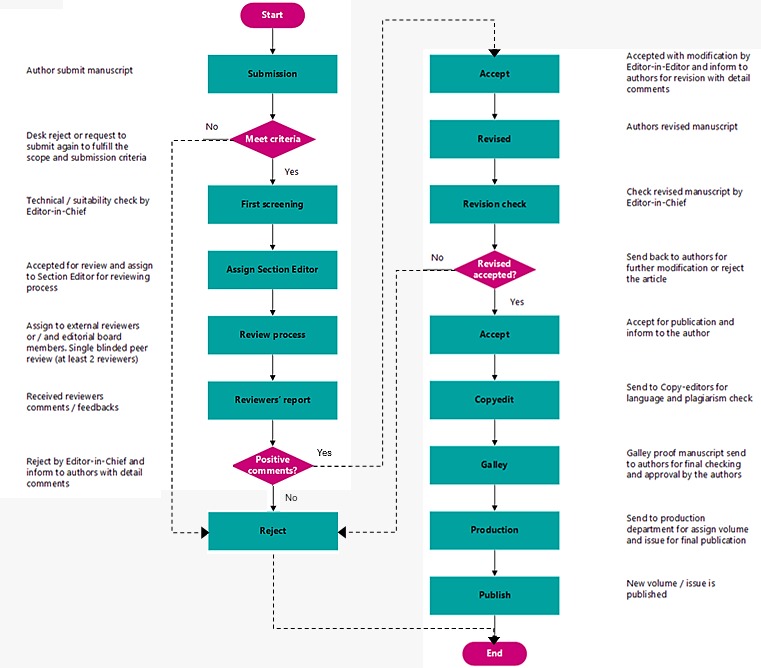Editorial Policy
Peer Review Policy
Peer-reviewed articles are essential to the advancement of structured, credible, and high-quality academic knowledge. Kertas of Information and Communication Science (KICS) upholds rigorous peer-review standards to ensure the scholarly value, integrity, and contribution of all published work.
KICS uses a single-blind peer review process, where reviewers remain anonymous to the authors, while authors’ identities are visible to the reviewers.
Initial Editorial Screening
All manuscripts undergo an initial assessment by the Editor-in-Chief or designated Section Editors to determine suitability based on:
-
Alignment with KICS scope and thematic focus
-
Originality and contribution to the field
-
Compliance with submission guidelines and formatting requirements
Manuscripts that pass this screening are sent for full peer review.
Peer Review Process
Each manuscript is typically evaluated by two independent expert reviewers. Reviewers are selected for their subject-matter expertise and familiarity with the manuscript’s content area.
Reviewers assess the manuscript based on the following criteria:
-
Originality: Novelty and innovation of research
-
Significance: Sound interpretation and justified conclusions
-
Structure and Format: Adherence to KICS author guidelines
-
Relevance: Value to the KICS readership and information/communication science fields
-
Language Quality: Clarity and professionalism in English
-
Overall Merit: Scholarly rigor and contribution to the discipline
The Editor-in-Chief makes the final decision on publication. Editors recuse themselves from handling manuscripts where a conflict of interest exists (e.g., co-authorship, familial relationship, institutional ties, or commercial involvement). Such manuscripts are handled by an unbiased editorial member.
Review Outcomes
After peer review, the editorial decision will fall into one of the following categories:
-
Accept as is: The manuscript meets all criteria with no revisions (rare).
-
Accept with minor revisions: Minor editorial or formatting changes required.
-
Accept after major revisions: Significant improvements needed in structure, analysis, or methodology.
-
Revise and resubmit: A new version may be considered in a future round after substantial revision.
-
Reject: Manuscript does not meet publication standards or relevance to KICS.
Reviewer comments may be edited by the editorial team to ensure professional tone and to remove any confidential or inappropriate content. Feedback marked as confidential by reviewers will be visible only to the editors.
Editorial Discretion
-
Editors or editorial board members may serve as reviewers when there are no conflicts of interest.
-
The Editor-in-Chief may consult additional experts as needed.
-
Final publication decisions are based on reviewer feedback, author responses, and the manuscript’s contribution to the field.
Review Process Flowchart


